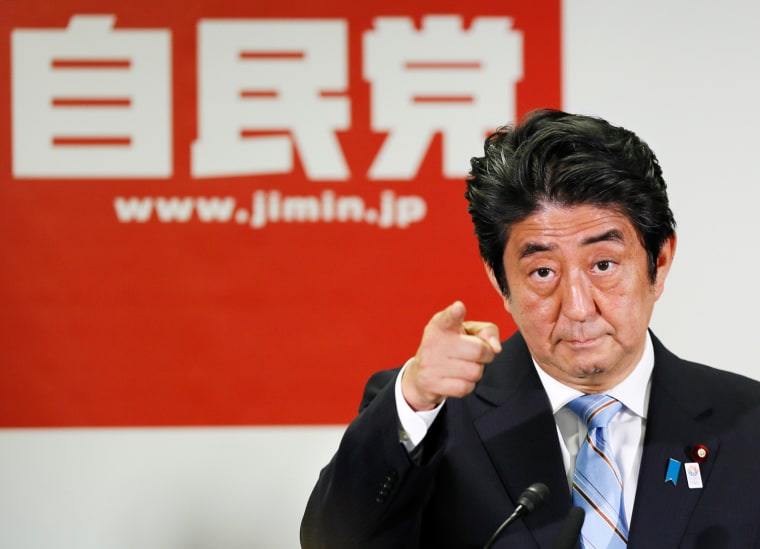TOKYO — A decisive election victory for Japan’s Liberal Democratic Party-led governing coalition has boosted Prime Minister Shinzo Abe’s pro-business economic agenda, popularly known as “Abenomics.”
"We are extremely pleased,” Hiromasa Yonekura, the chairman of Keidanren, one of Japan's largest business associations and the voice of big business in the country, said on Monday. "Now we would like to see the necessary policies to lift Japan out of its deflation and reinvigorate the economy as soon as possible."
Jump-starting Japan’s languishing economy has been Abe’s priority, particularly as economic growth is one of the preconditions for a planned tax boost to eight percent from five percent. The tax hike is seen as a vital to supporting the nation's pension and social welfare programs, as well as helping lower Japan national debt, which at $10 trillion is the world’s largest.
Sunday's Upper House election result ends a period of political gridlock brought on by a divided parliament, and was seen as a test of the government’s action plan on the economy.
The government has been in favor of increasing the supply of cash - boosting spending through large public works, deregulation and tax breaks.
Even before the election, the markets expressed their approval of Abenomics - Tokyo's stock market has risen by nearly 40 percent in the seven months since he took office. The country’s currency — an important factor in Japan's export-driven economy — has fallen to a five-year low, giving manufacturers a competitive edge.
By focusing on the economy, the prime minister appears to be setting aside other ambitions, such as revising the nation's constitution to give Japan's Self Defense Forces an expanded role. There is widespread uneasiness at the prospect of growing the country’s military capabilities.
"In terms of the revising the constitution, we don't envision changing all the clauses all at once. Rather, this will involve careful discussions and ultimately have the public vote on it," Abe said when asked about his future plans.
However, low voter turnout showed that that public approval is not overwhelming. At 52.61 percent, it was the third-lowest voter participation since 1947.
Nonetheless, the LDP and its partner New Komeito won 76 of the 121 seats up for grabs in the 242-member upper house. Along with the coalition's uncontested seats, the coalition now has a good majority and a better chance at staying in power until the next general election.
"I feel the public has given us a strong push on our backs,” Abe said during a press conference. "Now that we hold a majority in both houses, we must answer to the commitments we made to the public and accelerate the implementation of our policies."
Japan’s two parliamentary houses have been at loggerheads since 2007, resulting in political stalemates over major government policies.
Related:
